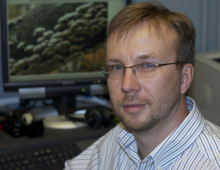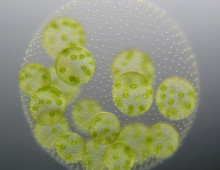The evolution of multicellularity occurred repeatedly and independently in diverse lineages including animals, plants, fungi, as well as green and red algae. This transition is one of the great evolutionary events that shaped life on earth, says co-first author Simon E. Prochnik, Ph.D., a Computational Scientist at the DOE Joint Genome Institute. It has generated…
Volvox carteri project on ACED
One of the most pivotal steps in evolution-the transition from unicellular to multicellular organisms-may not have required as much retooling as commonly believed, found a globe-spanning collaboration of scientists led by researchers at the Salk Institute for Biological Studies and the US Department of Energy’s Joint Genome Institute. Read more on ACED
Volvox carteri project on redOrbit
One of the most pivotal steps in evolution-the transition from unicellular to multicellular organisms-may not have required as much retooling as commonly believed, found a globe-spanning collaboration of scientists led by researchers at the Salk Institute for Biological Studies and the US Department of Energy’s Joint Genome Institute. A comparison of the genomes of the…
Volvox carteri project on NCTimes
Multicellularity is one of life’s great innovations. The ability of many individual cells to work together as a single being is so profound that scientists have regarded it as an immensely complicated process, requiring a huge amount of genetic retooling. But the process may have been simpler than previously thought, according to a new study…
Volvox carteri project on EurekAlert
One contribution that may inform biofuels research is reported in the July 9 issue of Science (http://bit.ly/aSGJc3), where researchers led by the DOE Joint Genome Institute (JGI) and the Salk Institute present the 138 million nucleotide genome of Volvox carteri, a multicellular alga that captures light energy through photosynthesis. The DOE is supporting research into…
Breaking Biomass Better: DOE JGI Sequences Wood Decaying Fungus to Advance Biofuels Prospects
WALNUT CREEK, CA—One of the challenges in making cellulosic biofuels commercially viable is to cost-effectively deconstruct plant material to liberate fermentable energy-rich sugars. The U.S. Department of Energy (DOE) is funding several projects focused on identifying enzymes in organisms that optimally degrade cellulosic feedstocks. One such source are fungi, which break down dead wood and…
Volvox carteri project on GenomeWeb
In this week’s issue of Science, research led by investigators at the Department of Energy’s Joint Genome Institute examines the organismal complexity of the multicellular green alga Volvox carteri. Simon Prochnik et al. sequenced the Volvox genome to 11.1-fold coverage using a whole-genome shotgun approach; when compared to Chlamydomonas reinhardtii, its unicellular relative, the team…
Genome Signatures Enable Tracking of Algal Complexity
WALNUT CREEK, CA—On the long and difficult road toward a carbon-neutral source of transportation fuels, the U.S. Department of Energy (DOE) is pursuing a diversified approach. This effort involves exploring a range of potential new fuel sources in nature: from plants that may serve as cellulosic feedstocks—fast-growing trees and perennial grasses on land—to oil-producing organisms…
Volvox genome belies “Small is Simple” Axiom
In the July 9, 2010 issue of Science, researchers led by the DOE JGI and the Salk Institute report on the 138 million-base genome of the multicellular alga Volvox carteri. The work complements the genome of the unicellular alga Chlamydomonas reinhardtii, which was sequenced by the DOE JGI in 2007 and is used by researchers…
DOE JGI’s role in managing Human Microbiome Project data on redOrbit
At JGI, Kyrpides oversees projects such as GenePRIMP, a highly rated quality control program for genome sequencing, and GOLD, the Genomes On-Line Database. GenePRIMP stands for “Gene PRediction IMprovement Pipeline, and it consists of a series of computational units that can be used to significantly improve the overall quality of the predicted genes in any…

